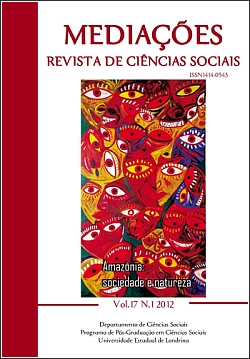Ka'a Wata, "walk in the woods" hunting and territory in an Amazonian Tupi group
DOI:
https://doi.org/10.5433/2176-6665.2012v17n1p172Keywords:
Territory, Hunting, Awá-Guajá, Harakwá, WatáAbstract
Based on the analysis of how territory is conceived and used during hunting activities by a Tupi-Guarani community from eastern Amazon, the Awá-Guajá, this article proposes an initial analysis of the conception of territory and territorial mobility for this community. I present the notions of harakwá and watá, arguing that the actions in the forest, expressed mainly by the ideas of «to walk» and «to hunt», are central to the understanding of the Awá-Guajá territoriality.Downloads
References
BALÉE, William. Footprints of the forest: Ka'apor ethnobotany - the historical ecology of plant utilization by an amazonian people. New York: Columbia University Press, 1994.
BIRD-DAVID, Nurit. Beyond the original affluent society: a culturalist reformulation. Current Anthropology, Chicago, v. 33, n. 1, p. 25-47, 1992.
BRIGHTMAN, Robert. The sexual division of foraging labor: biology, taboo, and gender politics. Comparative Studies in Society and History, Cambridge, v. 38, n. 4, p. 687-729, 1996.
CORMIER, Loretta A. Kinship with monkeys: the Guajá foragers of eastern Amazonia. New York: Columbia University Press, 2003.
DESCOLA, Philippe. La selva culta: simbolismo y praxis en la ecologia del los Ashuar. Quito: Abya-Yala, 1998.
DESCOLA, Philippe. As lanças do crepúsculo: relações jívaro na Alta Amazônia. São Paulo: Cosac Naify, 2006.
DOOLEY, Robert A. Vocabulário do Guarani. Brasília: Summer Institute of Linguistics, 1982.
FAUSTO, Carlos. Inimigos fiéis: história, guerra e xamanismo na Amazônia. São Paulo: EDUSP, 2001.
FORLINE, Louis Carlos. The persistence and cultural transpormation of the Guajá indians: foragers of Maranhão State, Brazil. 1997. Thesis (Doctor in Anthropology) - University of Florida, Miami, 1997.
GALLOIS, Dominique Tilkin. O movimento na cosmologia Waiãpi: criação, expansão e transformação do universo. 1988. Tese (Doutorado em Antropologia Social) - Universidade de São Paulo, São Paulo, 1988.
GARCIA, Uirá F. Karawara: a caça e o mundo dos Awá-Guajá. 2011. Tese (Doutorado em Antropologia Social) - Universidade de São Paulo, São Paulo, 2011.
GOMES, Mércio Pereira. O povo Guajá e as condições reais para sua sobrevivência. In: Povos indígenas no Brasil 1987/88/89/90. In: RICARDO, Carlos Alberto. Povos indígenas no Brasil 1987/88/89/90. São Paulo: Centro Ecumênico de Documentação e Informação - CEDI, 1991. p. 354-369.
HOLMBERG, Allan R. Nomads of the long bow: the Siriono of Eastern Bolivia. New York: The Natural History Press, 1969.
HUXLEY, Francis. Selvagens amáveis: um antropologista entre os índios Urubus do Brasil. Rio de Janeiro: Companhia Editora Nacional, 1963.
INGOLD, Tim. The perception of the environment: essays in livelihood, dwelling and skill. London: Routledge, 2000. In: INGOLD, Tim. Lines: a brief history. London: Routledge, 2007.
JARA, Fabíola. El camino del kumu: ecología y ritual entre los Akuriyó de Surinam. Quito: Abya-Yala, 1996.
LARAIA, Roque. Tupi: índios do Brasil atual. São Paulo: Universidade de São Paulo, 1986.
LEE, Richard; DALY, Richard. The Cambridge encyclopedia of hunters and gatherers. Cambridge: Cambridge University Press, 1999.
LÉVI-STRAUSS, Claude. O cru e o cozido. São Paulo: Cosac Naify, 2004.
LIMA, Tânia Stolze. O dois e seu múltiplo: reflexões sobre o perspectivismo em uma cosmologia tupi. Mana: Estudos de Antropologia Social, Rio de Janeiro, v. 2, n. 2, p. 21-47, out. 1996.
RIVAL, Laura M. Introduction: South America. In: LEE, Richard; DALY, Richard. The Cambridge encyclopedia of hunters and gatherers. Cambridge: Cambridge University Press, 1999. p.77-84.
RIVAL, Laura M. Trekking through history: the Huaorani of Amazonian Ecuador. New York: Columbia University Press, 2002.
RIVIÈRE, Peter. Individual and society in Guiana: a comparative study of amerindian social organisation. Cambridge: Cambridge University Press, 1984.
STERMAN, Allyn MacLean. Yuquí: forest nomads in a changing world. Mason, OH: Thomson Learning, 2001.
VIVEIROS DE CASTRO, Eduardo. Araweté: os deuses canibais. Rio de Janeiro: Jorge Zahar, 1986.
VIVEIROS DE CASTRO, Eduardo. Os pronomes cosmológicos e o perspectivismo ameríndio. Mana: Estudos de Antropologia Social, Rio de Janeiro, v. 2, n. 2, p. 115-144, out. 1996.
Downloads
Published
How to Cite
Issue
Section
License
Copyright (c) 2012 Uirá Garcia

This work is licensed under a Creative Commons Attribution 4.0 International License.
Copyright on articles published in Mediações belongs to the author(s): in the case of partial or entire republication of the original publication, we ask author(s) to indicate the original publication in the periodical.
Mediações uses the Creative Commons Attribution 4.0 International license, which allows Open Access, enabling any user to read, download, copy and disseminate its content so long as adequately referenced.
The opinions expressed by the author(s) are their sole responsibility.
































